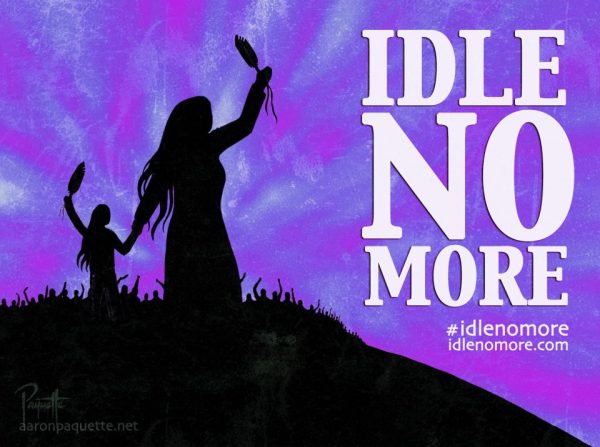Change the conversation, support rabble.ca today.
Movements come and go. Often seemingly unpredictable, they emerge from a social/political soup as a definitive moment signifying that a change is coming. More often than not, whether people believe it or see it, the change is already well underway. Idle-no-more is a movement that has flashed, is burning and like all movements will consume some of history.
While movements share a great deal in common they each have original characteristics that impact and change the face of society and sometimes the whole of humanity. Because of this some peoples, like the Palestinians or South Africans, can lay claim to and assert ownership over their particular movements. But movements are also connected like waves; we cannot separate on racial lines the American Civil Rights movement from the anti-slave movements a century and a half earlier. Women continue to define their independence and human value outside of the male/female binary through an evolution of movements.
What may be at the heart of it all is the undeniable power of the Indigenous to resist and then reclaim and assert the indisputable connection between land and soul.
Idle No More does not just belong to people of near Indigenous heritage or to those who have been relative to failed treaties. There has been a longing in this country for a very long time for justice and natural respect for the land by many more than our numbers. It is certainly a wake-up call for the present First Nations leadership that their acquiescence to domination isn’t a legitimate political position anymore.
But don’t be confused; Idle No More means nothing to the likes of Stephen Harper and his followers any more than Martin Luther King’s letters meant to George Wallace (Governor of Alabama) or American racists. Harper could care less whether Teresa Spence lives or dies. She does not stand in the way of his economic agenda. But Teresa means everything to us. Her life is our life.
As a movement Idle No More will leave in its wake a legacy. The content and quality of that legacy will depend on how the movement unfolds, what people do, who will emerge as leaders of the people and what stories will be told about the heroines and heroes of the movement. These do not stand alone, but are raised by the mass of individuals whose life force anonymously buoys humanity, expresses it in simple but heroic gestures often conceived in a moment and forgotten with the change in mood.
While Idle No More lives it will thrive. Like an animate creature it will turn and twist, laugh and cry, piss and vomit, smash and condole, but it will live. And it will connect the ends of the timeless struggle for freedom. In doing so it will create a new narrative, new stories, and the remembering of old ones that should never have been forgotten.
In asymmetrical struggles their must always be martyrs. No matter how stringent the risk management strategies are conceived there is an axiom of sacrifice that must be atoned. It’s just the way it is.
My hope for Idle No More is that the casualties will be the old guard, those leaders who have thrived within the asymmetry of colonialism. Perhaps this is their one and only chance for redemption. It is time for new leaders who will not accept “no” as a promise or “maybe” once you have surrendered. The earth and our humanity are too precious to be put on the market. New leadership is what Idle-no-more is seeking, and I hope we find it.
As a people we have been told that our poverty is a consequence of a lack of education. We have not had enough, not nearly as much of colonial economy and social hierarchy as we need to be full-fledged members of an affluent society that is dependent on sucking the earth dry and desolate. Perhaps, it’s time to turn the table.
Well, let Idle No More be instructive. Let’s do everything we can to educate Canadians to the spiritual and cultural poverty they endure. Join the movement.
Robert Lovelace is an adjunct lecturer at Queen’s University in the Department of Global Development Studies. His academic interests include Indigenous Studies, Sustainable Development and Aboriginal education. Robert is also an activist in anti-colonial struggles. In 2008, Robert spent 3 ½ months as a political prisoner for his part in defending the Ardoch Algonquin First Nation homeland from uranium exploration and mining. Robert is a retired chief of the Ardoch Algonquin First Nation. He lives in the Algonquin highlands at Eel Lake in the traditional Ardoch territory.



